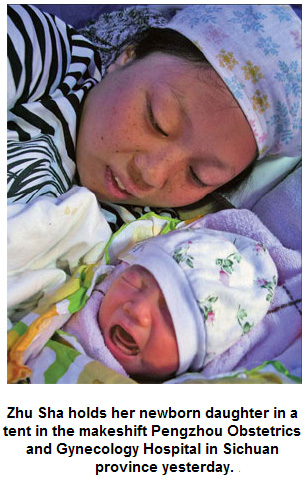Surrounded by dilapidated houses and rubble, the neatly lined tents could be mistaken for makeshift shelters for quake survivors, but for the occasional cry of babies.
With patients from all over Pengzhou's towns and counties, the Pengzhou Obstetrics and Gynecology Hospital (now reduced to eight tents) has seen the birth of 57 babies, 22 of whose mothers are from the quake-hit areas, since last Monday.
The births have brought some cheers in the gloom amid the destruction. "The newborns have brought a very special feeling," says Xie Li, a physician at the hospital.

The 30-year-old, who has no children of her own, lost her mother when their house collapsed in the quake. But Xie says she is lucky to have been able to pull out her mother's body from the rubble and perform the last rites.
"I'm thankful too for not having a child, for I don't know what would've happened to it."
Xie has taken just one day off work since the quake, when she went to Tongji township for her mother's funeral on the May 15.
Tongji sits in the lap of the mountains and was one of the worst hit areas. She returned that evening, and has been working round the clock since then.
"Our job is critical," she says. "On one hand, there are hardly any bloody scenes here. On the other, however, almost every person we treat carries two lives (mother, child)."
Zhu Sha knows that fact better than most people. A resident of Tongji too, the 19-year-old lies quietly, smiling shyly beside her daughter, who was born on Sunday, just hours after she reached the hospital.
She was watching her husband Yang Bo play Chinese chess with relatives just outside their house at 2:28 pm on May 12. When the quake struck, her 23-year-old car mechanic husband thought the deafening roar was coming from a large truck passing by.
"Let's see what brand it is," Yang said, turning his head with a grin. It was then that he realized it was no truck because the ground had begun shaking violently. Seconds later, their house began to crumble.
Yang hurried his family members out of the falling house and took them to a distant relative's home. Though it was damaged, too, "it somehow felt safer it wasn't destroyed, and we had more people together (than in my house)," Zhu says.
The couple couldn't sleep on that fateful night, and they spent the next in the open. It was only on the morning of May 14 that the local armed police sent them tents, water and umbrellas, just hours before showers began and continued intermittently for two days.
"And to think that I'm still alive and have a daughter now," Zhu says shyly.
"Let's call the baby Zhenfen (which sounds like 'excited by something' in Chinese," a relative of Yang says in a lighter vein. Instantly, the baby lets out a cry. "Okay, I take that as a 'no'," the relative retracts.
"I haven't seen or heard about a time when people have shown so much unity and confidence," Xie says. "Too many people have died, but a far greater number have lent a helping hand to the survivors. It makes me feel that our work is truly worth it."
Till 4 pm on Tuesday, the official death toll in Pengzhou was 870. Many more are still buried, and feared to be dead.
(China Daily May 22, 2008)